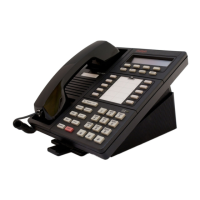MERLIN LEGEND Communications System Release 6.1
System Manager’s Guide
555-661-118
Issue 1
August 1998
New Features and Enhancements
Page xxRelease 6.1 Enhancements (August 1998)
Centralized Voice Messaging 0
One or more MERLIN LEGEND systems (Release 6.1 or later) can share the
voice messaging system (VMS) of another MERLIN LEGEND system. In this
configuration, the system containing the VMS is known as the hub. This sharing of
the VMS is called “Centralized Voice Messaging.” Centralized Voice Messaging
includes the functions of voice mail and Automated Attendant. See the
Network
Reference
for detailed information about Centralized Voice Messaging.
Centralized Voice Messaging offers the following benefits:
■ Networked systems do not need a local VMS. Having systems use a
centralized VMS instead of separate VMS’s saves money.
■ Users at networked systems can dial the same digits anywhere in the
network to access VMS. For example, a salesperson headquartered in
Cincinnati can dial the same four digits at the company’s Los Angeles
office to retrieve voice messages.
■ Productivity is enhanced because messages can be forwarded and
broadcast across the network.
■ Calling groups on networked systems can send overflow coverage to a
shared VMS, where incoming callers can leave messages for individuals or
groups.
■ One VMS can light the Message Waiting lights on any number of systems.
This greater efficiency saves time.
Group Calling Enhancements 0
A calling group can have a
single
non-local member that is defined by the Uniform
Dial Plan as existing on another MERLIN LEGEND Communications System
connected by a tandem trunk. If a calling group contains a non-local member, the
non-local member must be the
only
member in the calling group. See the
Network
Reference
for details.
A calling group containing a single non-local member can be used for many of the
same purposes as a calling group containing local extensions, including:
■ Night Service. Night Service coverage can be provided across a private
network to a centralized Automated Attendant, a non-local calling group, a
QCC queue, a DLC, or any individual extension on the remote system,
such as a night bell.
■ Group Coverage. Group Coverage can be provided across a private
network to a VMS, a non-local calling group, a QCC queue, a DLC, or any
individual extension on the remote system.
■ Calling group overflow coverage. Calling group overflow coverage can
be provided by a centralized VMS, a non-local calling group, a QCC queue,
a DLC, or any individual extension on the remote system.

